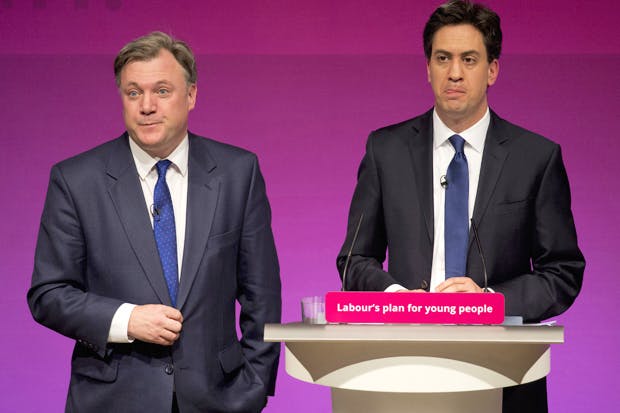The interesting thing about Labour’s pledge to abolish non-dom tax status — a squib designed to trap Tories into expressing sympathy for the rich, in the knowledge on the part of Ed Miliband and Ed Balls that it might cause loss of tax revenues and inward investment — is that it has been welcomed by influential voices in the City. The Eds must be astonished to find Sir Roger Carr, chairman of BAE Systems and former deputy chairman of the Bank of England, bang on message: he told the FT that non-dom rules are ‘a relic of the past that unfairly favours the few at the expense of the many’. Likewise veteran financier Dame Alison Carnwath, chairman of Land Securities and one of this column’s beacons of good City sense, said the rules are ‘out of date and should be scrapped’.
Leave aside the East India men and Greek shipowners for whom the rules were originally framed, and the reputable non-doms who pay HMRC £8 billion (5 per cent of all income tax receipts) on their UK income while sheltering overseas earnings. What’s behind the Carr response is the suspicion that non-dommery has become a common tax avoidance device for highly paid executives of global businesses. And that creates jealousies inside the silo of the seven-figure-salaried, notoriously insensitive to the plight of the world outside: the Canary Wharf trading floor on which dubious non-doms take home more than high-performing UK taxpayers is, we may guess, an unhappy place. I once met a director of a famous investment bank who told me ruefully he was the only non-non-dom among 23 London board members. For entirely the wrong reasons, the Eds may have hit on something that really does need reforming.
As for the Conservative promise of a post-election sale of Lloyds Banking Group shares with discounts and loyalty bonuses for small investors, it is aimed at bringing a feelgood whiff of 1980s capitalism to the closure to Lloyds’ painful passage through state hands — and it deserves a better reception than the Guardian’s description of it as ‘a bung to those people able to write a cheque for a few thousand quid at short notice’. George Osborne’s ‘million-pound inheritance tax giveaway’, on the other hand, is less than it sounds, since it applies to married couples and civil partners who can already bequeath £650,000 between them tax-free and would now receive an additional £175,000 allowance per partner, applicable only to property bequeathed to direct family.
But ringing that magic ‘million’ bell should be just enough to catch the attention of homeowners in outer suburban and provincial postcodes that happen to fall in Tory marginals and targets. And that’s what it’s all about, isn’t it? As the daily cacophony of cheap shots, non-answers, uncosted bribes and predictions of doom drowns out anything that sounds like vision, wisdom, optimism or national pride, I sincerely hope the tax status of the opposing ‘master strategists’, Australian Lynton Crosby for the Tories and American David Axelrod for Labour, makes it imperative for them to leave these shores on 8 May, never to return.
Men of bottom
Every corporate crisis reminds us of the value of wise non-executive chairmen and directors, and it’s good that the best should be singled out for awards. I was particularly pleased to see that of six garlanded by the Sunday Times this week, three — John Hughes of precision instrument maker Spectris, John Macfarlane of insurer Aviva (and about to take the chair at Barclays), and Sir John Parker of mining giant Anglo American — might be described as stout yeomen, as indeed might Sir Roger Carr mentioned above, and your ample columnist.
We may be a challenge to our tailors but we are comfortable in our skins and as Shakespeare said, ‘Let me have men about me that are fat… and such as sleep o’ nights.’ The non-exec gents in their group photograph make a nice contrast to the ‘lean and hungry look’ of fellow winner Lady Judge of the
Pension Protection Fund. Is she, I wonder, one who ‘thinks too much’?
Hear My Song
Saturday night in O’Donoghue’s pub, a stone’s throw from the Taoiseach’s office: a lyric tenor to match Josef Locke is singing with accordion-banjo backing to a packed and happy multinational crowd. It’s magical, and it makes me think how much the United Kingdom — with our divisions of money, class, region and culture made daily more bitter by cynical electioneering — has to learn from recovering Ireland, a place that feels increasingly at ease with itself.
Post-crisis Dublin is the polar opposite of Athens, a positive role model for any society trying to pull out of adversity. Here the spring air is full of optimism — but tinged with self-awareness. ‘We’re terrified of going back to the “Celtic Tiger” days,’ my host tells me. ‘We just know how bad we are with money. Have you seen the figures for new car sales?’ I have, and they’re eye-popping: up a third in March compared with a year ago, Porsches and Maseratis selling as fast as Guinness at O’Donoghue’s. After huge post-crisis falls, house prices are up 16 per cent year on year, the steepest rise in the EU, while unemployment is back below the eurozone average and about to break 10 per cent, having peaked above 15.
Meanwhile, resentment of the Fine Gael-Labour coalition’s austerity programme is largely confined to protest against new water charges. I hear no word of hostility towards the EU and the IMF for the tough bailout terms imposed in 2011 and no regrets (quite the opposite) about membership of the euro. Dublin is proudly — and audibly, in terms of languages heard on the street — a European capital, while shrewdly deploying ultra-low corporate taxes to make the most of Ireland’s American cousinage. As for ill-feeling towards the British, it’s long gone. If anything, I sense a kind of puzzled sympathy: ‘That’s a pretty bloody election you’re having over there, isn’t it?’
Got something to add? Join the discussion and comment below.
Get 10 issues for just $10
Subscribe to The Spectator Australia today for the next 10 magazine issues, plus full online access, for just $10.















Comments
Don't miss out
Join the conversation with other Spectator Australia readers. Subscribe to leave a comment.
SUBSCRIBEAlready a subscriber? Log in